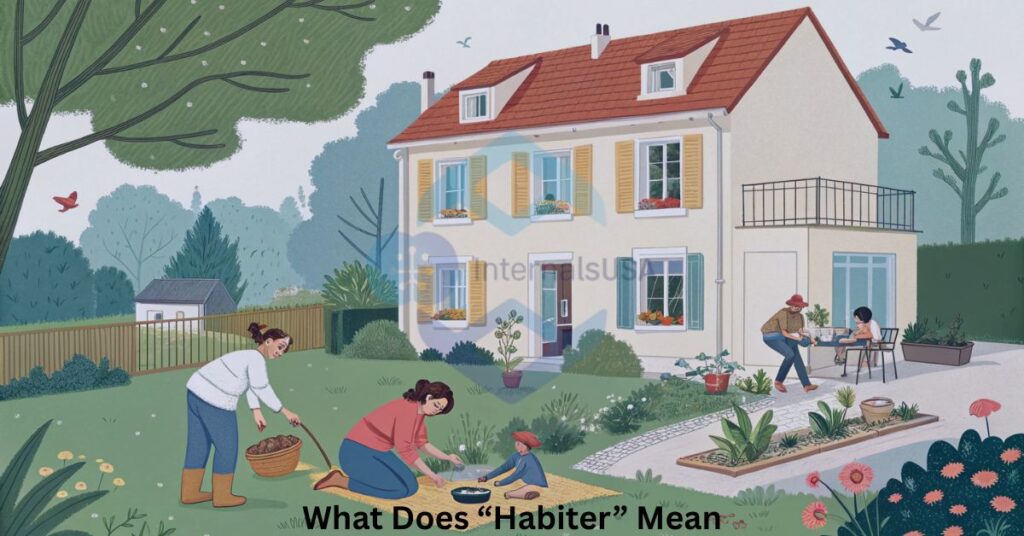Habiter Conjugation: Mastering One of French’s Most Essential Verbs
Discover a complete guide on habiter conjugation, a fundamental French verb meaning “to live” or “to reside.” This detailed breakdown helps learners understand how to conjugate habiter in all major tenses: present, past, future, conditional, and subjunctive, making it perfect for students, travelers, and anyone learning French. Whether you’re mastering French grammar for the first time or brushing up your skills, this article provides examples, usage tips, and easy-to-follow conjugation tables.
Understand how habiter changes with different pronouns like je, tu, il/elle, and nous across various contexts. You’ll also learn important nuances of regular ER verbs and how habiter fits into daily conversations. Designed for clarity and accuracy, this conjugation guide empowers readers with the tools needed to speak and write more fluently in French. Unlock the power of communication with this essential verb and boost your French vocabulary with confidence.
Perfect for beginners and intermediate learners alike. Unlock the full potential of your French language skills with this in-depth guide to the habiter conjugation. Learn how to conjugate the verb “habiter” across all major tenses, present, past, future, conditional, and subjunctive, and discover practical examples and tips to improve usage. Whether you’re a beginner or intermediate learner, understanding the habiter conjugation is key to expressing where and how people live in French. With conjugation charts, pronunciation guidance, and learning tools, this complete resource is everything you need to master “habiter” confidently.
Introduction
In the journey of learning French, mastering verb conjugations is critical. One verb that stands out for its frequency and importance in everyday conversation is habiter, meaning “to live” or “to reside.” Whether you’re talking about your hometown, your dream destination, or where someone used to live, habiter conjugation plays a central role in articulating these ideas clearly and correctly.
This complete guide to habiter conjugation will cover its usage across the major French tenses, explore how to use it in real-life contexts, provide pronunciation tips, and give you tools to remember its forms. If you’re looking to build a strong foundation in French, start here.
What Does “Habiter” Mean?

The French verb habiter is commonly used to describe someone’s place of residence. It directly translates to “to live” in English but is more often used to mean “to reside” in a specific place.
Examples
- Elle habite à Marseille. (She lives in Marseille.)
- Où est-ce que vous habitez ? (Where do you live?)
Habiter is a regular verb, so it follows a standard conjugation pattern, which makes it easier for learners once they become familiar with the rules.
Why Learn Habiter Conjugation Early?
Habiter is one of the first verbs taught in French classes for a few reasons:
- It’s frequently used in both written and spoken French.
- It teaches you the regular-er verb pattern, which applies to over 80% of French verbs.
- It’s essential for common conversations (introductions, location, daily life).
Learning the habit of conjugation equips you with tools for basic yet meaningful communication.
Conjugation Overview
Here’s a quick look at the major tenses we’ll cover:
- Présent (Present Tense)
- Passé Composé (Past Tense)
- Imparfait (Imperfect Tense)
- Futur Simple (Future Tense)
- Conditional Present (Conditional)
- Subjonctif Present (Subjunctive)
- Impératif (Imperative)
Present Tense – Le Présent

Use the present tense to talk about where someone currently lives.
| Subject Pronoun | Conjugation | Example |
|---|---|---|
| Je | habite | Je habite a Paris. |
| Tu | habites | Tu habites ici ? |
| Il/Elle/On | habite | Il habite en ville. |
| Nous | habitons | Nous habitons ensemble. |
| Vous | habitez | Vous habitez ou ? |
| Ils/Elles | habitent | Elles habitent pres du parc. |
Pronunciation Tip: The ent ending in habitent is silent, so it sounds like habit.
Passe Compose – Compound Past Tense
The passe composé describes a completed action in the past.
Formula
Avoir (present) + past participle habite
| Subject | Conjugation | Example |
|---|---|---|
| J | ai habite | J ai habite a Londres. |
| Tu | as habite | Tu as habite la ? |
| Il/Elle | a habite | Elle a habite avec ses parents. |
| Nous | avons habite | Nous avons habite dans une ferme. |
| Vous | avez habite | Vous avez habite ici longtemps ? |
| Ils | ont habite | Ils ont habite ensemble. |
Imparfait – Imperfect Past
Use the imparfait to describe past habits or ongoing situations in the past.
| Subject | Conjugation | Example |
|---|---|---|
| Je | habitais | Je habitais a la campagne. |
| Tu | habitais | Tu habitais avec ta famille ? |
| Il | habitait | Il habitait dans une grande maison. |
| Nous | habitions | Nous habitions pres du fleuve. |
| Vous | habitiez | Vous habitiez au Canada ? |
| Ils | habitaient | Ils habitaient ensemble autrefois. |
Future Tense – Futur Simple
Use the futur simple for intentions or plans.
| Subject | Conjugation | Example |
|---|---|---|
| Je | habiterai | Je habiterai a Tokyo. |
| Tu | habiteras | Tu habiteras dans un appartement ? |
| Il | habitera | Il habitera avec ses amis. |
| Nous | habiterons | Nous habiterons en Italie. |
| Vous | habiterez | Vous habiterez pres de la plage ? |
| Ils | habiteront | Ils habiteront a l etranger. |
Conditional – Conditionnel Present
Use this tense for hypotheticals or polite expressions.
| Subject | Conjugation | Example |
|---|---|---|
| Je | habiterais | Je habiterais a la montagne si je pouvais. |
| Tu | habiterais | Tu habiterais dans un chateau ? |
| Il | habiterait | Il habiterait dans un studio. |
| Nous | habiterions | Nous habiterions pres de la gare. |
| Vous | habiteriez | Vous habiteriez en ville ? |
| Ils | habiteraient | Ils habiteraient ailleurs. |
Subjunctive – Subjonctif Present
The subjunctive mood expresses doubt, emotion, or necessity.
| Subject | Conjugation | Example |
|---|---|---|
| Que je | habite | Il faut que je habite ici. |
| Que tu | habites | Il est important que tu habites pres de l ecole. |
| Qu il | habite | Je veux qu il habite avec nous. |
| Que nous | habitions | Il faut que nous habitions ensemble. |
| Que vous | habitiez | Je souhaite que vous habitiez la. |
| Qu ils | habitent | Ils veulent qu ils habitent au même endroit. |
Imperative – L Imperatif
Use the imperative to give commands.
| Habitons! | Conjugation | Example |
|---|---|---|
| Tu | Habite ! | Habite ici avec moi. |
| Nous | Habitez! | Habitons ensemble ! |
| Vous | Habitons ensemble! | Habitez près du centre ! |
Using Habiter in Real-Life Scenarios
Let’s explore some daily life phrases with habiter:
- J’habite en banlieue. (I live in the suburbs.)
- Ils ont habité au Canada pendant 5 ans. (They lived in Canada for 5 years.)
- Nous habiterons ensemble après le mariage. (We will live together after the wedding.)
Learning these phrases boosts your confidence and helps you speak fluently in French conversations.
Habiter vs Vivre
Though both mean “to live,” habiter refers to a physical place, while vivre can also mean “to experience life.”
| French | English |
|---|---|
| J habite a Nice. | I live in Nice. |
| Je vis heureux. | I live happily. |
Use a habiter when talking about a place and vivre when referring to lifestyle or experiences.
Tips to Master Habiter Conjugation
Create Flashcards: Focus on each tense separately.
Use Real Sentences: Apply conjugation in context.
Repeat Out Loud: Practice pronunciation.
Write Daily Logs: Include sentences like “Aujourd’hui, j habite…”
Test Yourself: Take quizzes using apps like Duolingo or Conjuguemos.
Frequently Asked Questions (FAQs)
Is “habiter” always used with prepositions like “à” or “en”?
Yes, when using habiter, it is commonly followed by prepositions like à (for cities) or en/au (for countries).
What’s the difference between “j’habite” and “je vis”?
J’habite refers to the physical residence. Je vis refers to how one lives (emotionally, spiritually, or generally).
Can “habiter” be reflexive?
No. “Habiter” is never reflexive. It’s a transitive verb used with a direct object (the place).
How do you say “I have lived” in French using “habiter”?
“I have lived” is j’ai habité in the passé composé tense.
How do I remember all these forms?
Use spaced repetition systems (SRS), speak aloud, and apply each form in meaningful sentences related to your life.
Conclusion
Understanding and mastering habiter conjugation is a critical part of becoming fluent in French. This versatile, regular verb shows up in basic conversations, formal writing, and daily interactions. By practicing each tense, present, past, future, conditional, and beyond, you’ll gain the confidence to use “habiter” in real contexts and avoid common mistakes.
Whether you’re just starting out or looking to strengthen your foundation, use this guide to take your learning further. Remember: the key to success in French lies in consistent practice, real-world usage, and learning in context. Now that you know how to conjugate habiter, go out there and say proudly: “J’habite dans le monde francophone !”
Also Read
Best Tips for a Clean and Organized Personal Lifestyle
Lifestyle Med: A Holistic Approach to Lasting Health and Wellness
Smart Lifestyles: The Ultimate Guide to Living Smarter, Healthier, and Greener








Leave feedback about this